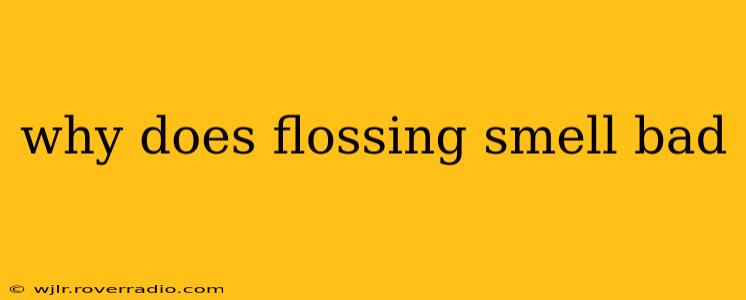Why Does Flossing Smell Bad? Unraveling the Mystery of Malodorous Dental Floss
Flossing is crucial for maintaining good oral hygiene, but sometimes that fresh-breath feeling is overshadowed by a less-than-pleasant aroma. Why does flossing smell bad? The answer is multifaceted, but largely boils down to the removal of bacteria and their byproducts from areas your toothbrush can't reach. Let's delve into the common culprits.
What Causes the Bad Smell When Flossing?
The unpleasant odor you experience while flossing usually stems from the bacteria residing between your teeth. These bacteria thrive on food particles, sugars, and other debris trapped in those tight spaces. Their metabolic processes generate volatile sulfur compounds (VSCs), the primary source of bad breath (halitosis). These compounds, including hydrogen sulfide and methyl mercaptan, are responsible for that characteristic rotten-egg or sewage-like smell.
Is it Normal for Floss to Smell Bad?
To a certain extent, yes. If you haven't flossed in a while, or if you have poor oral hygiene, a bad smell is entirely expected. It simply indicates that you're removing a significant amount of accumulated bacteria and their waste products. However, if the smell is consistently strong or accompanied by other symptoms, it warrants a visit to your dentist.
Why Does My Floss Smell Bad Even Though I Brush Regularly?
Even with diligent brushing, food particles and bacteria can still accumulate between your teeth where your toothbrush can't reach. Brushing primarily cleans the surfaces of your teeth, leaving interdental spaces vulnerable to bacterial colonization. Therefore, regular flossing is essential for complete oral hygiene, even if your breath seems fresh after brushing.
Can Certain Foods Make My Floss Smell Worse?
Absolutely. Foods high in sulfur-containing compounds can exacerbate the smell. These include:
- Onions: Known for their pungent aroma, onions contribute significantly to bad breath.
- Garlic: Similar to onions, garlic contains sulfur compounds that linger in the mouth.
- Eggs: Especially egg yolks, which contain sulfur-containing amino acids.
- Certain dairy products: Some cheeses and milk products can contribute to bad breath.
- Cruciferous vegetables: Broccoli, cauliflower, and cabbage contain compounds that can lead to stronger smells.
While these foods don't inherently cause the bad smell from flossing, they significantly increase the concentration of odor-causing compounds, making the smell more noticeable.
What Can I Do to Minimize the Bad Smell When Flossing?
Several strategies can help mitigate the unpleasant odor:
- Floss regularly: Daily flossing is crucial for preventing bacterial buildup.
- Brush thoroughly: Ensure you're brushing twice a day for at least two minutes each time.
- Use mouthwash: A therapeutic mouthwash can help kill bacteria and freshen breath.
- Drink plenty of water: Water helps rinse away food particles and bacteria.
- Maintain a healthy diet: Limit consumption of odor-causing foods.
- Visit your dentist regularly: Regular checkups and cleanings are essential for maintaining oral health.
In conclusion, a slightly unpleasant smell while flossing isn't necessarily cause for alarm. It often signals the effective removal of bacteria and their byproducts. However, persistent or excessively strong odors could indicate underlying dental problems. Consistent good oral hygiene practices are key to minimizing this smell and maintaining optimal oral health. If you're concerned, consult your dentist.
